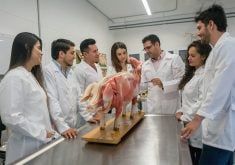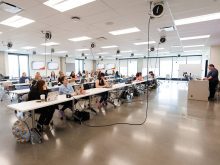ARBORG, Man. – The Bobbees don’t shy away from a challenge.
When you’re living on the edge anyway, why not try things that other farmers wouldn’t dare?
That seems to be the operating philosophy of the Bobbee family, who live and farm at the edge of Manitoba’s farmable land in the Interlake region between lakes Winnipeg and Manitoba.
The family built and operated an on-farm biodiesel plant, helped set up a local biodiesel co-operative and is heavily involved in the hemp industry.
“It’s a good life,” said Paul Bobbee on a snowy mid-November day as he, his brother David, David’s son Jeff and Paul’s daughter Jill worked at the 1,000 acre farm and seed cleaning plant just north of Arborg.
Read Also

Fuel rebate rule change will affect taxes and AgriStability
The federal government recently announced updates to the fuel rebates that farmers have been receiving since 2019-20.
“It’s not a bad life at all. You’ve got good years. Then you’ve got bad years, like this one. But in the end it will work out.”
It’s a terrible year for most farmers in the district. Heavy rains late in the season prevented most from getting their crops off the field and many crops still stand like wasted scarecrows.
Others look battered and bruised, with the soils deeply rutted as farmers attempted to clear the unharvestable crops.
The Bobbees were lucky to get their crops combined between rains, so they don’t have much still in the field. But their seed cleaning operation, Triple B Seeds, will likely stay dormant through most of the winter.
Paul said there’s little point cleaning the local grain crops because disease levels from growing season moisture are so high that even the cleaned seed might be unsalable. Until it’s clear that there will be a market for the seed, the plant won’t operate much.
But that doesn’t deflate Paul or David, who at ages 45 and 42, are the core of the farming operation.
The two have been entrepreneurial throughout their careers and seem to relish challenges.
Paul moved the family farm into the value-added business in 1985, after he returned to the farm from a job as a government seed and crop inspector. He set up the seed cleaning business.
“After seeing all the plants in Manitoba, I set up my own,” Paul said.
“I’d learned how it should be done.”
The Bobbee family is typical of many in the area, being descended from Ukrainian immigrants who homesteaded in the early 1900s.
It’s an area dominated by Icelanders who settled along Lake Winnipeg and local rivers and Ukrainians who were attracted to the farmland.
The family also jumped into the newborn hemp industry in 1999 as distributors for CGP. That ill-fated company, which collapsed and threw the hemp industry into chaos, managed to get interest in hemp production up and going, Paul said. But its demise was a good thing, in the long run.
“In a way it’s good that CGP had gone bankrupt, because all these small companies were able to take over. CGP would have had a monopoly if they had kept going.”
The family grows 1,000 acres of grain and hemp. Some years the family has farmed just a quarter of hemp and others it has planted up to 800 acres. Last year they grew none because their fields were too wet and they knew “hemp can’t take standing water.”
The family’s biodiesel operation came out of the brothers’ interest in trying to squeeze extra value from canola grown in the area. They didn’t spend their time trying to get other people to build a plant for them. They built their own small plant on the farm.
They produced about 20,000 litres, which they supplied to various industrial users, including Manitoba Hydro, for testing.
After the tests showed that locally produced canola biodiesel could approach commercial standards and be used safely, the Bobbees worked as part of 25 local partners to set up a bigger plant near Arborg called Bifrost Bioblends. It’s almost ready to start production, but needs to buy one more crucial piece of equipment to make commercial-grade biodiesel.
Neither David nor Paul seems intimidated by fringe industries like biodiesel or hemp.
“I’m not scared of it,” said Paul.
“It’s been working in our favour. All the farmers in this area have diversified. Up here, you have to.”
David said he and his brother don’t always have the same idea of when they should sell their crops, or which equipment to buy or sell in any given year.
But they know how to work together and come to decisions each can accept.
“After so many years, it becomes natural,” said David. “You get used to each other and just keep on going. It pays off in the long run.”
That long run includes the hope of each brother that his children will stay involved with and eventually take over the farm.
On this day David’s son, Jeff, is working in the seed cleaning office and Paul’s daughter, Jill, is working on the computer with her father.
“It’s good to help out,” said Jill, who had already worked the day at a local personal care home.
She said the extended family is tight and doesn’t mind working together in one big operation.
“We get along really well. We don’t really have fights,” she said with a laugh.















